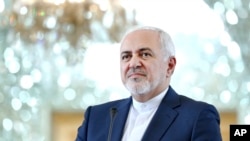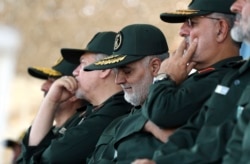Updated: Aug. 8, 5:02 p.m.
This article originated in VOA’s Persian Service. VOA Persian's Farhad Pouladi and Katherine Ahn and State Department Correspondent Cindy Saine contributed.
WASHINGTON — A week after the U.S. sanctioned Iranian Foreign Minister Mohammad Javad Zarif, raising the prospect of him losing access to U.S. social media platforms, U.S. officials and tech companies are mum on the issue.
The Trump administration sanctioned Zarif on July 31 for having “acted or purported to act” on behalf of Iranian Supreme Leader Ayatollah Ali Khamenei, whom it sanctioned a month earlier as part of its “maximum pressure campaign” against Tehran.
A Treasury Department statement announcing the move said Zarif was being sanctioned under President Donald Trump’s June 24 executive order blocking “all property and interests” of Khamenei under U.S. jurisdiction, as well as those of anyone who has “acted or purposed to act” for him. Section 4 of the order imposes a “prohibition” on providing “funds, goods or services … to or for the benefit of any person” whose property and interests are blocked pursuant to the order.
The Treasury statement said the department’s Office of Foreign Assets Control (OFAC) also had added Zarif to its list of Specially Designated Nationals and Blocked Persons, known as an SDN list.
The Treasury Department did not respond to a VOA Persian request for comment on whether the prohibition on providing “services” to Zarif includes a ban on giving him access to U.S. social media platforms, including his Twitter and Instagram accounts.
Followers
Zarif has 1.2 million followers on Twitter and 729,000 followers on Instagram, which is owned by Facebook. He has been active on both accounts in the days since his July 31 designation.
In one post, Zarif asked if his designation means that “U.S. persons need an "OFAC license to engage" with me by reading my writings or listening to interviews.”
After VOA Persian contacted the State Department regarding Zarif’s access to U.S. social media platforms, a spokesperson provided this response: “Twitter and Instagram are private companies. We refer you to them for questions on their handling of individual accounts.” The spokesperson also referred VOA to the Treasury Department for any additional clarification.
When asked again about Zarif's use of U.S. social media at Thursday's State Department press briefing, spokeswoman Morgan Ortagus told a VOA Persian correspondent: "I think he is still tweeting. It's too bad the Iranians can't tweet — the Iranian people."
Iran uses digital filters to block people from using Twitter and other Western social media platforms and messaging services, but it allows the use of Instagram. Many Iranians still have been able to access blocked services by using anti-filtering tools.
In a Thursday email, Twitter’s global policy communications director, Ian Plunkett, responded to a question about Zarif’s continued use of the platform by saying the company does not comment on individual accounts “for privacy and security reasons.”
In a separate email a day earlier, Stephanie Otway, Instagram’s policy communications manager, said the Facebook subsidiary also is unable to comment about Zarif’s account.
Instagram previously suspended the account of Qassem Soleimani, commander of the elite Quds Force of Iran’s Islamic Revolutionary Guard Corps (IRGC), on April 16, a day after the Trump administration designated IRGC as a Foreign Terrorist Organization (FTO).
A State Department notice said it is unlawful for a U.S. person “to knowingly provide material support or resources” to a designated FTO, and defines “material support or resources” to be “any property … or service.”
“For detail on the legal requirements specific to access (that) FTOs and SDNs have to social media services, I would direct you to OFAC or the U.S. State Department,” Otway wrote.
Possible violation
Mark Dubowitz, chief executive of Washington-based policy institute Foundation for Defense of Democracies, told VOA Persian that he believes Facebook and Twitter both are violating U.S. sanctions by providing services to Zarif, a sanctioned person.
“Zarif should be immediately expelled for legal reasons — not to mention moral reasons for using a platform (Twitter) that he and his regime deny to other Iranians,” Dubowitz said in a message.
In a sign of Congressional interest in the issue of Zarif’s use of U.S. social media, Republican House member Lee Zeldin posted a Tuesday tweet saying he also believes Zarif’s accounts should be blocked. In a message to Twitter CEO Jack Dorsey, Zeldin said the company “shouldn’t provide its invaluable resource to (Zarif), designated Foreign Terrorist Orgs (organizations) & others like them for their propaganda.”
It was not immediately clear if there is an informational exception in the sanctions program under which Zarif was designated that would allow him to keep his Twitter and Instagram accounts. Many U.S. sanctions programs carve out exceptions for designated people to engage in various types of information sharing, such as those involving noncommercial social media expression, news reports, books, articles and movies.
Section 1 of the June 24 executive order said its prohibitions apply “except to the extent provided by statutes, or in regulations, orders, directives, or licenses that may be issued pursuant to this order.” The Treasury Department also did not respond to a question about whether such exceptions apply to Zarif’s U.S. social media accounts.
In a Thursday message to VOA Persian, a former U.S. official said that if the Trump administration believes social media services clearly are prohibited by the sanctions, it would have an obligation to say so, rather than to merely refer inquiries to the companies providing those services.
“One could infer from that referral that the government may believe (the Zarif case) is a matter of reputational discretion within the scope of those companies’ decision-making authority. But it is not entirely clear from the government’s response,” the former official said.
“I could see Facebook and Twitter having some pretty good debates out in California about how to handle this one, because you can make a pretty good case on either side of it,” said Michael O’Hanlon, Brookings Institution foreign policy research director, in a VOA Persian interview. “My guess is that it is actually in a gray area that is going to require some judgment and perhaps even some disputes between those companies and the U.S. government before all is said and done.”





